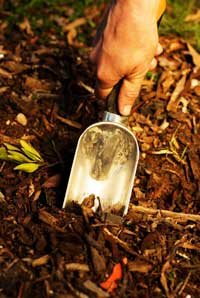Organic fertilizers used to be hard to find, but that’s changing fast.
Our understanding of the complex relationships among plants, soil and billions of beneficial organisms living in the soil — bacteria, fungi, insects — isn’t perfect, but we know that the more nutrient organic matter you add, the more fertile and workable your soil becomes.
We also know that synthetic fertilizers can’t make up for poor quality soil, and indeed, the more fertilizer you pour on, the worse the soil gets. It comes back down to the old saying: feed the soil, and the soil will soil feed your plants.
Organic materials improve soil structure

There are two main sources of organic matter: the decayed remains of once living material, plant residues and animal manures, known as humus, and finely ground rock particles rich in minerals.
These materials provide food for soil microorganisms, which, convert essential nutrients bound up in organic matter into water soluble forms that plant roots can readily take up and use for healthy growth.
Organic matter or compost has another great advantage for gardeners: it improves soil structure.
If you have sandy soil, you can increase its water- and nutrient-holding capacities by adding organic matter. If you have heavy clay soil, adding organic matter will make it more workable.
What plants need to grow well
All plants need elements such as nitrogen, phosphorus and potassium (the familiar NKP ratio on fertilizer packages), plus secondary minerals such as sulfur, calcium and magnesium. They also need iron, manganese, zinc, chlorine, boron, copper and nickel, but in very small quantities.
The mineral elements that plants need are found naturally in healthy soil, but some soils may be low or lacking in one nutrient or more. Good compost can supply plant nutrients, and is easy to make from leaves, vegetable peelings, garden wastes and grass clippings.
By continually returning good disease-free organic matter to the soil, you should have the right amounts of nutrients available for most ornamental plants.
Fast-growing, nutrient-gobbling plants such as vegetables may benefit from adding organic fertilizer, for example, liquid or foliar fertilizers applied through the growing season.
Organic versus synthetic fertilizer
While it’s true that plant roots can’t tell the difference between nitrogen from an organic source or nitrogen from a manufactured one, non-organic fertilizers are so concentrated that over time they create imbalances in the soil that reduce the all-important microbial and earthworm activity.
Organic fertilizer is naturally slow-releasing. Nutrient value isn’t available to plants immediately, as the soil microorganisms need time to break down substances into forms plants can use.
For this reason, it’s best to apply organic materials in advance: for example, add a mulch of compost or well-rotted manure and a sprinkling of blood meal to garden beds in spring and again in fall.
Alternatively, top-dress beds with granular organic fertilizer. These are made from materials such as fish-meal, rock phosphate, greensand, gypsum and kelp meal. Follow application-rate instructions on the package.
If using manure, always apply composted rather than fresh, which can burn due to excess nitrogen.
Related Information
Benefits of liquid organic fertilzer
Learn about composting for added garden soil fertility




